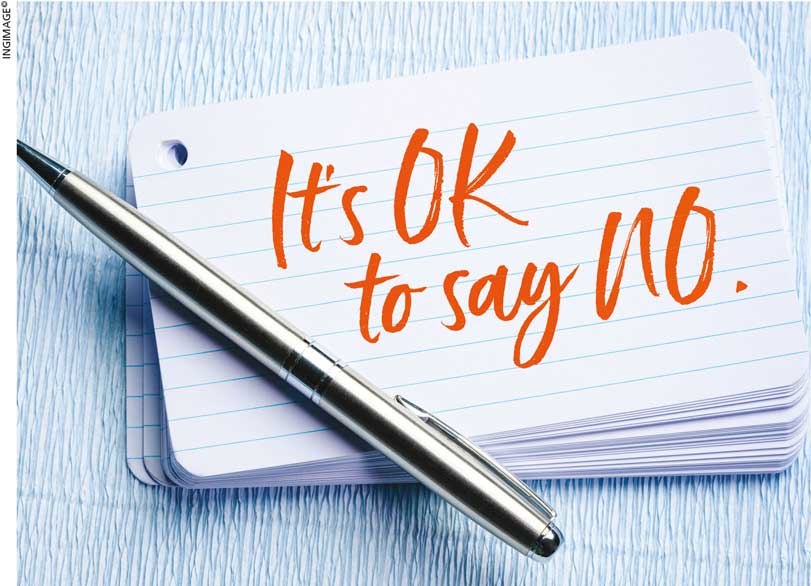TIME MANAGEMENT
SAYING ‘NO’ TO SUCCEED!
Naysaying can help achieve success at times – Manilka Ediriweera explains
How many times have you had to attend a family gathering that you didn’t want to attend, been persuaded by others to do something you don’t enjoy or found yourself taking on a little more work although you were already overwhelmed with a host of other projects?
 And how many times have you found yourself sitting through a meeting where you didn’t have a real contribution to make?
And how many times have you found yourself sitting through a meeting where you didn’t have a real contribution to make?
In order to make others happy and satisfy them, we often tend to field requests that come our way by agreeing to undertake them. Whether it’s a customer, coworker or even supervisor, we find ourselves saying ‘yes’ to their requests – and they could be formal, informal, large or small.
By trying to please them even when we are swamped and overwhelmed, we’re left busy and occupied most of the time. Indeed, this is definitely not the ideal situation to find ourselves in.
We’re torn between saying ‘yes’ and turning down these requests because we fear rejection, don’t want to upset others or are uncertain about how they will respond if we say ‘no.’
And that’s not to assert that saying ‘yes’ doesn’t have any benefits because it certainly has its advantages. For instance, agreeing to undertake the right things can present new opportunities in your career and life while encouraging you to try, learn and fail at the same time.
However, saying ‘yes’ to everything will lead to little or no good, and result in a waste of time, energy and resources.
The inability to say ‘no’ will leave you with less time to engage in things that matter; and it will also affect your mental health. Besides, when we agree to do something that we don’t necessarily like or want to do, we often tend to dislike what we’re doing and also resent the person who requested us to do so.
This resentment will not only affect your mindset but impact your productivity and success too. As the 19th century American humourist and writer Josh Billings once remarked, “half of the troubles of this life can be traced to saying ‘yes’ too quickly and not saying ‘no’ soon enough.”
So you must learn to say ‘no’ – and as Brazilian lyricist and novelist Paulo Coelho has said, be advised that “when you say ‘yes’ to others, make sure you’re not saying ‘no’ to yourself.”
It is often uncomfortable and arduous to say ‘no’ but it’s crucial for us to understand that the way we manage these requests will eventually determine our success both in our professional and personal lives.
According to Warren Buffet, we must choose what we say ‘yes’ to and ‘no’ to with the intention of simplifying, prioritising and focussing on what matters the most. Therefore, saying ‘no’ will provide individuals with the necessary time, energy and resources to focus on the more consequential matters while relieving them of unwanted pressure and stress.
If you find it difficult to say ‘no’ outright, assess the request. Doing so will not only help you better understand what’s asked but also enable you to decide whether investing your energy for this purpose is the right thing to do.
In such instances, preparing an intake memo with all the specifics of the request is a promising idea because it will assist you to make smarter decisions – and help you deliver a well reasoned ‘no.’
Saying ‘no’ at the right time and for the right reasons will save time and trouble for all concerned. So if you aren’t allowed to do something, or if it cannot or shouldn’t be done, a well-reasoned ‘no’ at the right time is best.
In an age where all of us have a lot to do with so little time, always saying ‘yes’ to requests from others will lead to burn out even though it will make you feel important and valued for a fleeting period at least. However, saying no will help you prioritise matters, and lead to self-care and success.
Before saying ‘yes’ therefore, think of all the possibilities you’d have if you weren’t swamped and drowning with the things you hastily agreed to do. Value your time, know your priorities and be honest about what’s truly important and urgent, and ask yourself whether it will help you achieve your own goals or hamper them before you say ‘yes’ or ‘no.’
Say ‘no’ at the right time and make every ‘yes’ count – because the right ‘yes’ will help you make a difference, achieve success and be productive, while serving others and increasing your influence.
Establish firm boundaries and constantly engage in activities that will challenge you to do better – things that will inspire and support you, to grow and reach your goals.




